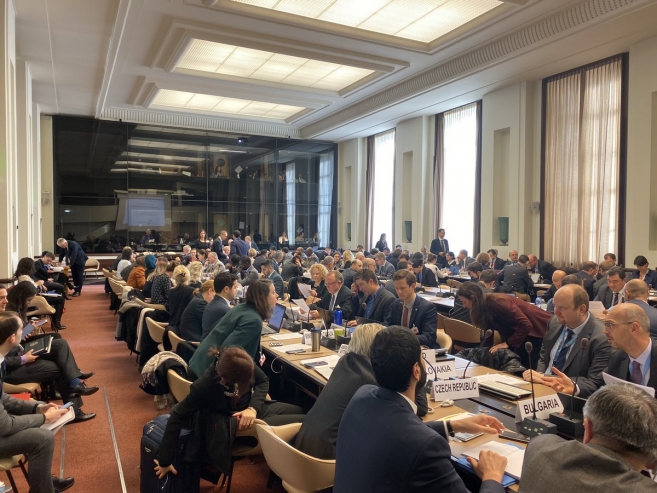
INEW statement
Geneva Consultations: “Towards a Political Declaration to Address the Humanitarian Harm Arising from the use of Explosive Weapons in Populated Areas
18 November 2019, Laura Boillot, International Network on Explosive Weapons (INEW), Geneva
Thank you, Ambassador,
I am speaking on behalf of INEW, the International Network on Explosive Weapons.
INEW, in line with the call of the UN Secretary-General, strongly supports the urgent development of an international political declaration to prevent and reduce the harms caused by the use of explosive weapons in populated areas.
We are pleased to be here today at the start of a process to develop a political declaration. A stronger international standard of behaviour against the use of heavy explosive weapons in towns and cities is urgently needed.
Already this year there have been over 16,000 civilian casualties from explosive weapons recorded through English-language media monitoring – this is by no means the whole picture. When explosive weapons have been used in populated areas, 90% of the casualties have been civilian. And so far in 2019, at least 56 countries have seen civilian casualties from explosive violence.
After engaging on this theme in political forums for a decade now, the need to establish a framework to address this harm, and start to reduce civilian casualties, remains urgent.
An international political declaration can help to set new international standards, and serve as a tool to drive forward policies and shape practice at a national level, which prioritise the protection of civilians in armed conflict.
With this in mind, a political declaration must do three main things:
First, it must seek to prevent and reduce the humanitarian harm from the use of explosive weapons in populated areas. This includes both direct harm such as civilian deaths, injuries, and the destruction of housing and infrastructure, and indirect harm caused by the disruption of essential services, and other reverberating effects.
Second, it should recognise in particular the harm that results from the use of explosive weapons with wide area effects in populated areas. Explosive weapon systems that have been designed for use in open battlefields are inappropriate in urban contexts and other populated areas.
Third, it should recognise the rights of victims, and support the provision of assistance to affected individuals and communities.
In order to do this, a political declaration should describe the harm it seeks to address, and contain strong, action-oriented commitments. This should include commitments to:
- Develop operational policies and procedures to stop or avoid the use of explosive weapons with wide area effects in populated areas, this we see as the centrepiece of a declaration and the most effective way to prevent harm – it should also:
- Ensure that victims of armed conflict are supported towards the full realisation of their rights and ensure the provision of assistance to individuals and affected communities, including access to essential services, and that people’s basic needs are met;
- Support and undertake data gathering including data on victims of explosive weapons disaggregated by sex, age, and ability, and data on the weapon types used in populated areas and their impacts;
- Enable humanitarian and protection measures, such as promoting unimpeded access to humanitarian aid, and promoting the provision of risk education and clearance;
- And finally, build a community of practice, including through regular meetings to discuss progress towards reducing harm, including sharing of positive practice and experiences.
A political declaration should not, however, be a mere restatement of international humanitarian law.
We are familiar with the assertion that international humanitarian law is sufficient and that what is needed is greater compliance. Whilst we agree of course that greater compliance with the law is essential, we also continue to see a high degree of civilian harm caused by actions which do not deliberately target civilians, where attacks are directed against military objectives in populated areas, and by actors who claim to be in full compliance with the law.
A new standard that clearly sets a presumption against the use of explosive weapons with wide area effects in populated areas is urgently needed.
Thank you.
